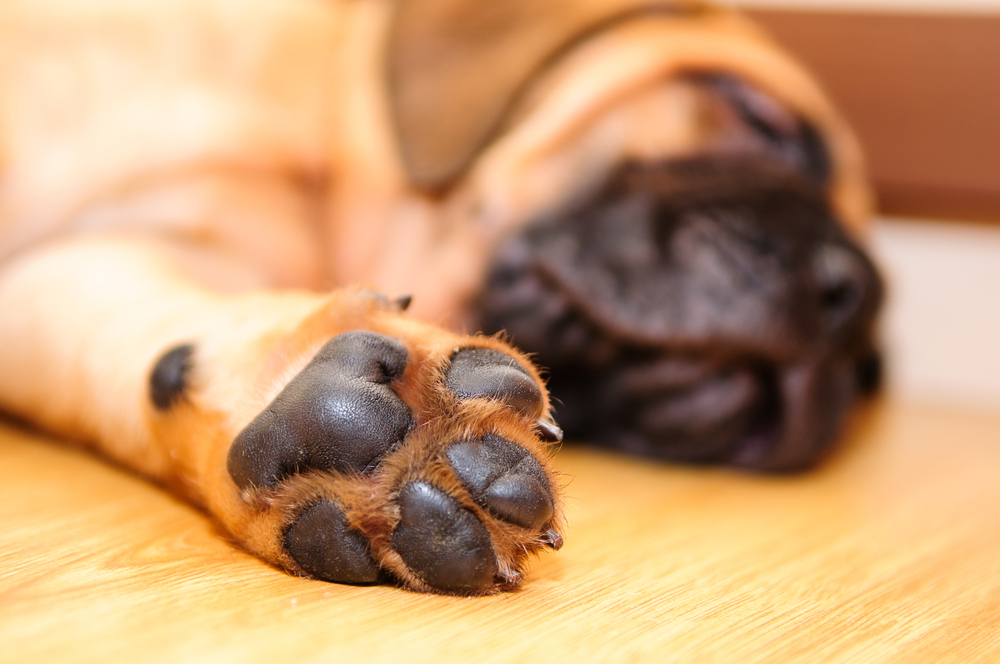
It’s vitally important for pet owners to know when a behavior is normal and when it’s something to worry about. Dogs self-groom by licking their paws. If your dog is occasionally licking for the purpose of cleaning, then that’s normal and nothing to be concerned about. If your dog is biting their paws or is excessively and intensely licking their paws, then that’s a cause for concern and you may want to consult your veterinarian.
Reasons Your Dog Is Licking and Biting Their Paws
Your Dog Has Food Allergies
If your dog is excessively licking or biting their paws, one possibility is that your dog has food allergies. Food allergies can make your dog’s paws itchy, which can lead them to bite or lick. Talk to your vet about your dog’s food for recommendations on specific food and potential ingredient allergies.
Your Dog Has a Parasite
If your dog has a parasite, such as mange or fleas, their paws may itch, causing them to lick. Check your dog for flea bites and mange spots, which are caused by mites. These parasites are tiny, so even if you don’t see physical evidence of them, it’s a good idea to consult with your veterinarian, who can determine if there’s a parasite involved and recommend any necessary treatment.
Your Dog Has Dermatitis
Dermatitis can affect dogs as well as humans. It’s a skin condition that involves itching. It can be caused by a variety of things, from an allergy to bacteria. If you suspect dermatitis, you can consult with your vet to make sure it’s not caused by bacteria. If your dog frequently licks their paws after coming in from outside, keep a bowl of water near the door so you can wash their paws off when they come inside. Dermatitis in dogs can be caused by allergies to a number of things, including:
- Food
- Dust
- Grass
- Trees
- Mold
- Insects
- Weeds
- Lawn treatment chemicals
Just like in humans, dogs’ allergies can be year-round or seasonal, so be on the lookout for behavior changes as the seasons change. Luckily, allergies in dogs are very treatable once the cause is found. Some of the common treatments are:
- Fish oil (naturally anti-inflammatory)
- Medicated shampoos
- Antihistamines
- Oral antibiotics (for severe cases)
Your Dog Is Injured
Injuries such as bee stings, cuts, torn nails, a blister, a stone or thorn stuck between the pads, or other small injuries can irritate your dog’s paw. If you see that your dog is biting or excessively licking one paw in particular, check to make sure there’s not a small injury-causing irritation. You may be able to treat the injury with basic first aid, but if it doesn’t improve, or if the injury is more serious, you’ll want to take your dog to the vet.
Take special care of your dog’s paws to ensure that they don’t get injured and develop behaviors such as excessive licking and biting of their paws.
- Clean your dog’s paws after coming in from outside
- Check their paws for foreign objects
- Consider dog booties for extremely hot or cold days
Your Dog Has a Health or Behavioral Problem
Licking can also be a sign of a health problem or a behavioral problem like boredom or anxiety. Speak to your veterinarian if you can’t figure out why your dog is excessively licking or biting their paws. Your vet should be able to help you pinpoint what’s going on and if there’s a health or behavioral issue they can advise you on how to manage it.
How to Assess Your Dog’s Condition
The first thing that you should do if you notice your dog licking or biting at their paws is check for visual clues of the cause. Sometimes you can see discoloration or a rash, so you know exactly what is causing the pain or discomfort and can inform your vet about it during your visit.
Check in between their toes and under their paws for any of the following:
- Punctures
- Burns
- Foreign bodies such as ticks or fleas
- Glass
- Splinters
- Bleeding
- Swelling
- Redness
- Odor
Be on the lookout for any other behavior that may be a sign of pain, such as limping or lack of movement.
Is Your Dog Licking and Biting Their Paws?
Contact us to schedule an appointment.




